 Most viewed - Toyooka 豊岡市 Most viewed - Toyooka 豊岡市 |

When you arrive JR Toyooka Station, you will soon notice that the Oriental white stork ("kounotori" in Japanese) is the symbol of the city. Even the roof looks like a soaring bird. 132 views
|
|

Oriental White Stork manhole in Toyooka, Hyogo Prefecture.112 views
|
|

Directional sign at JR Toyooka Station.110 views
|
|

Oriental White Stork manhole in Toyooka, Hyogo Prefecture.104 views
|
|
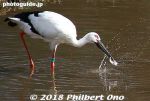
Oriental white stork eating a fish.103 views
|
|
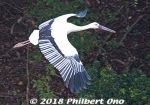
I didn't expect to see the storks flying around, so I was thrilled when a few of them flew overhead while I was in the park. They flew in during feeding time.102 views
|
|

102 views
|
|

101 views
|
|
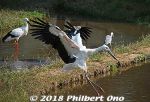
White stork landing in the paddy during feeding time.101 views
|
|

White stork mail box at Oriental White Stork Park in Toyooka, Hyogo.99 views
|
|
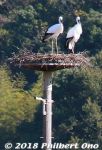
Two Oriental white storks on a nesting platform. Each nesting platform has a video camera monitoring it 24/7 especially during the egg-laying and hatching season in spring.99 viewsThe park is likely crowded during this time until the babies leave the nest in June/July.
|
|
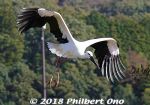
97 views
|
|
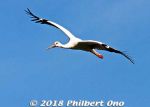
The Oriental white stork is a big, beautiful bird often mistaken as the Japanese crane. Wingspan is 2 meters.95 views
|
|

Toyooka was where the last living Oriental white stork in Japan died in 1986. Pesticides in rice paddies (where they feed) and other environmental problems caused their demise.95 views
|
|
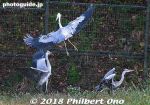
Grey herons also drop by, but they are always fighting each other.95 views
|
|

Feeding time for the storks also attracts unwanted birds like black kites. They swoop in and steal a fish, then don't come back.94 views
|
|

Kinosaki Onsen manhole in Toyooka, Hyogo Prefecture.93 views
|
|

Manhole with Shinkoro Clock Tower design in Izushi, Toyooka, Hyogo Prefecture.89 views
|
|

Manhole with Shinkoro Clock Tower design in Izushi, Toyooka, Hyogo Prefecture.86 views
|
|

Vending machine with Oriental white stork design motif at JR Toyooka Station.79 views
|
|

On Caban Street, this drink vending machine designed like a bag. Toyooka, Hyogo.76 views
|
|

Love Toyooka's bag bus.72 views
|
|

Onsenji Temple's Tahoto pagoda.67 views
|
|

Yanagi-yu public bath in Kinosaki Onsen, Toyooka, Hyogo. "Yanagi" means willow tree. The third public bath I've seen (but didn't enter). Open 3:00 pm–11:00 pm, closed. Thu. 柳湯65 views
|
|

Izushi soba is famous for having cold soba served on five small plates. Dip the noodles in the broth while adding different garnishes like grated yam, onions, and raw egg. 出石そば64 views
|
|

Onsenji Temple. Enter the temple here. Onsenji belongs to the Koyasan Shingon Buddhist sect. It worships an 11-face Kannon statue. Founded in 738 by the priest Dochi, Onsenji Temple is regarded as Kinosaki Onsen's guardian. 温泉寺64 views本坊
|
|

Ichinoyu, perhaps the most famous public bath in Kinosaki Onsen. Looks like a kabuki theater. 一の湯63 viewsToyooka, Hyogo Prefecture.
|
|

Airline with a plane donning an Oriental White Stork motif.61 views
|
|

Lots of soba restaurants in Izushi. This lunch cost ¥870. You can also order more plates of noodles. The history of Izushi soba goes way back to the early 18th century when the local lord brought it from Nagano (Shinano soba). 出石そば60 views
|
|

Gosho-no-yu public bath in Kinosaki Onsen, Toyooka, Hyogo. Looks palatial. (御所の湯).60 views
|
|

Onsenji Temple's Hondo main hall. National Important Cultural Property. Photography is not allowed inside the temple. temple founder and priest Dochi (道智上人) is also the founder of Kinosaki Onsen hot spring. 60 views
|
|

Shinkoro Clock Tower in Izushi, Toyooka, Hyogo Prefecture is one of Japan's oldest clock towers along with the Sapporo Clock Tower also built in 1881. 辰鼓楼57 views
|
|

Eirakukan's rotating kabuki stage.55 views
|
|

Bus stop shelter near Kou-no-Yu in Kinosaki Onsen, Toyooka, Hyogo.55 views
|
|

Spider web.55 views
|
|

You can also go underneath the stage and see the revolving stage. It's rotated by hand. Wow neat, how often can you see something like this?54 views
|
|

The Oriental white stork has black and white wings and a black bill.54 views
|
|
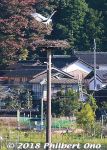
Landing on a nesting platform.54 views
|
|

The bus going to Hyogo Park of the Oriental White Stork Park is designed like a bag to promote Toyooka as a bag-producing city.53 views
|
|

The storks are carnivores, feeding on fish, frogs, snakes, rabbits, mice, etc. 53 views
|
|

As of Oct. 2018, Japan has over 140 Oriental white storks in the wild. They are also successfully breeding in Tokushima, Shimane, and Kyoto Prefectures. 53 viewsIt's still an endangered species, with only slightly over 2,000 of them in the Far East.
|
|

53 views
|
|
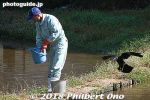
Crows also drop by.53 views
|
|

Storks swallow the fish whole.53 views
|
|

The hanafuda card with the "crane" is actually an Oriental white stork. It actually looks like a cross between the two birds...53 views
|
|

Caban Street's most prominent bag shop is this one called Artisan Avenue. The front has a woven basket motif. Toyooka, Hyogo Prefecture.52 views
|
|

Toyooka Oriental White Stork Culture Center's open cage for Oriental white storks. It includes paddies used for feeding. The cage is "open" because it only hasa fence and no roof.52 views
|
|

About the Oriental white stork open cage.52 views
|
|
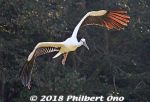
52 views
|
|

52 views
|
|

52 views
|
|

Gift shops in this building next to the parking lot.52 views
|
|

Eirakukan (永楽館), the Kansai Region's oldest kabuki theater built in 1901. Toward the left was the theater's front entrance that is not used anymore because of the road right in front. They now use a side entrance.51 views
|
|

Oriental white stork decoration at JR Toyooka Station. To see real, living Oriental white storks, you have to visit the Hyogo Park of the Oriental White Stork Park.51 views
|
|

Hyogo Park of the Oriental White Stork has a few buildings amid large rice paddies and mountains.51 views
|
|

Huge rice paddy within Hyogo Park of the Oriental White Stork.51 views
|
|

Toyooka Oriental White Stork Culture Center's open cage for Oriental white storks. There are about nine storks in the open cage. Their wings have been clipped to they cannot fly. 51 views
|
|

They are throwing small dead fish into the paddies. 51 views
|
|

They make a loud clacking noise with their bills.51 views
|
|

51 views
|
|

51 views
|
|

51 views
|
|

About the biotope.51 views
|
|

Park's website: http://www.stork.u-hyogo.ac.jp/en/51 views
|
|

Shinkoro Clock Tower was orignally used to beat taiko drums from 7 am to 9 am to notify people that the castle lord arrived at the castle. A mechanical clock from the Netherlands was later donated by a local doctor to make it a clock tower in 1881. 辰鼓50 views
|
|

50 views
|
|

The building in the middle is the University of Hyogo Graduate School of Regional Resource Management.50 views
|
|

Inside the Oriental White Stork Culture Center. Walk through this building to the other side of the building to see the open cage.50 views
|
|

So if you go to Hyogo Park of the Oriental White Stork, you can see real Oriental white storks.50 views
|
|

Around 9:30 am to 10 am, they feed the storks. This is the best time to visit the park. And the best chances of seeing storks flying around.50 views
|
|

50 views
|
|

Screening room.50 views
|
|

Nesting platform.50 views
|
|

Toyooka in Hyogo Prefecture is a major producer of bags. Thier local bus even has a bag design.49 views
|
|

Toyooka's bag bus.49 views
|
|

Eirakukan Theater in Izushi, Toyooka, Hyogo.49 views
|
|

Gate to Hyogo Park of the Oriental White Stork. Open: 9:00 am–5:00 pm, closed Mondays (open if a national holiday and closed the next day instead), December 28th–January 4th.49 views
|
|

On the left is the Toyooka Kounotori Bunkakan or Oriental White Stork Culture Center.49 views
|
|

In 1985, six wild Oriental white stork chicks from the USSR (Khabarovsk) were acquired to be raised in Toyooka. From 1989, the birds from Russia started to breed successfully in captivity in Toyooka every year. 49 views
|
|
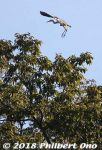
49 views
|
|

49 views
|
|

49 views
|
|

Back inside the Oriental White Stork Culture Center. On the left is the European white stork with a red bill, on the right is the Oriental white stork with a black bill. Very similar.49 views
|
|

Exhibits.49 views
|
|

Confection shaped like stork eggs.49 views
|
|

Rice paddy has a high nesting platform. The nest still intact.48 views
|
|

Once found all over Japan, the Oriental white stork ("kounotori" in Japanese) became extinct in the wild in Japan in 1971 despite preservation efforts since 1955.48 views
|
|

From 2005, the park started releasing Oriental white storks into the wild in Toyooka, which was a great celebration. The birds then started to breed and reproduce in the wild.48 viewsThey've been releasing only a few birds (fewer than 5) almost every year.
|
|

Oriental white stork nests are large, about 2 meters diameter, made of tree branches and straw.48 views
|
|

48 views
|
|

Even insects.48 views
|
|

From JR Toyooka Station, there are buses that go to Hyogo Park of the Oriental White Stork Park. However, they run only once or twice an hour. Bus schedule under the purple column.47 views
|
|

Kounotori can also mean "bird bringing happiness." Sculpture related to the bird of happiness. Makes people happy especially when the stork delivers your baby.47 views
|
|

Basic map of Hyogo Park of the Oriental White Stork. Only one building on the left is open to the public.47 views
|
|

On the right is the park's administrative building.47 views
|
|
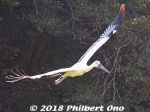
47 views
|
|

47 views
|
|

47 views
|
|

Part of the park is a large biotope used as a stork sanctuary and research facility. Only part of it is open to the public.47 views
|
|

47 views
|
|

Large biotope used as a stork sanctuary and research facility.47 views
|
|

46 views
|
|

Aquariums with fish.46 views
|
|

Dressing room.42 views
|
|

Izushi's symbol is the Shinkoro Clock Tower. This area is also a National Important Traditional Townscape Preservation District (重要伝統的建造物群保存地区). 辰鼓楼41 views
|
|

Shinkoro Clock Tower in Izushi, Toyooka, Hyogo Prefecture is one of Japan's oldest clock towers along with the Sapporo Clock Tower also built in 1881. 辰鼓楼40 views
|
|

Warning sign for drivers for small children. (It means to go slow.)40 views
|
|

Backstage has the dressing rooms for actors. Normally hidden by a curtain.39 views
|
|

Also a good snack is the Tajima beef bun.39 views
|
|

39 views
|
|

Advertising posters on the walls.38 views
|
|

On Nov. 3, Izushi holds the Oshiro Matsuri to reenact the daimyo procession.38 views
|
|

38 views
|
|

Next to the station is this collection of donated geta wooden clogs from local inns.38 views
|
|

Drinkabke hot spring water in front of JR Kinosaki Onsen Station.38 views
|
|
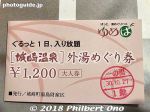
Guests who stay at a ryokan in Kinosaki Onsen can visit all seven public baths for free. But daytrippers like me have to pay admission for each one, costing ¥600 or ¥700. 38 viewsHowever, they have a public bath day pass for only ¥1,200 (外湯めぐり券). Use it to enter all seven. Great deal! Definitely one of the best bargains in Japan!
|
|

Hiking path to Onsenji Temple, but taking the ropeway is easier and faster.38 views
|
|

Kinosaki Onsen Ropeway station.38 views
|
|

37 views
|
|

Rotating kabuki stage.37 views
|
|

Izushi Town Hall37 views
|
|

Inside JR Kinosaki Onsen Station.37 views
|
|

Dressing and locker room for men at Jizo-yu.37 views
|
|

View from the cavern bath.37 views
|
|

Gift shop and plaza next to the Kinosaki Onsen's hot spring source. 温泉たまご場37 views
|
|

The small shack on the right is a foot bath. In the background is the ropeway station to Onsenji Temple. 37 views
|
|

Kinosaki Art Museum near Onsenji. Mostly Buddhist art. Small admission charged. Open 9 am–4:30 pm, closed second and fourth Thu. of the month when the ropeway is not operating. 城崎美術館37 views
|
|

Onsenji Temple's bell dates back to the early Edo Period.37 views
|
|

37 views
|
|

Kou-no-Yu is open 7:00 am–11:00 pm, closed on Tue. Oriental white stork statues next to Kou-no-Yu.37 views
|
|

Theater entrance on the side. The theater is a short walk from the Izushi bus stop and Izushi Castle.36 views
|
|

Inside Eirakukan. You can freely tour inside the theater. Very impressive and rare glimpse of a Meiji Period theater. 36 viewsThat's the hanamichi on the left. You can walk on it too.
|
|

Stage curtains.36 views
|
|

36 views
|
|

36 views
|
|

Other stairway.36 views
|
|

Izushi Castle in Toyooka was built in the early 17th century. No original structures remain except for the stone walls and foundations. Reconstructed turrets and a small shrine are on the castle grounds. 出石城36 views
|
|

Ariko-yama Inari Jinja Shrine atop Izushi Castle's main foundation. 有子山稲荷神社 36 views
|
|

Views of Izushi.36 views
|
|

Gift shop in Izushi.36 views
|
|

Gift shop in Izushi.36 views
|
|

Samurai residence.36 views
|
|

In front of JR Kinosaki Onsen Station.36 views
|
|

Jizo statue at Jizo-yu public bath.36 views
|
|

Entrance hall of Jizo-yu. Entrance for the men's bath on the left, and women on the right. Jizo-yu also has private baths. 地蔵湯36 viewsAll the public baths are segregated for men and women. A few of the public baths also have private baths that families or couples can rent.
|
|

Willow trees along the river at Kinosaki Onsen hot spring. 36 views
|
|

Otani River has four stone bridges and each one has a name.36 views
|
|

Foot bath next to Ichinoyu public bath. 海内第一泉36 views
|
|

Near Ichinoyu is this fountain for drinkable hot spring water.36 views
|
|

Main drag outside Ichinoyu.36 views
|
|

Rest area inside Gosho-no-yu (御所の湯).36 views
|
|

Jizo and Kannon statues along a rock wall.36 views
|
|

About the Benzaiten shrine.36 views
|
|

Gokurakuji Temple's Sanmon Gate. 山門36 views
|
|

Kinosaki Onsen's hot spring source. 源泉36 views
|
|

Aboit Tajima beef and Kobe beef.36 views
|
|

Kinosaki Onsen Ropeway takes only 7 min. to the mountain summit. The ropeway runs three times an hour most of the day from 9:10 am to 5:10 pm.36 views
|
|

Going up Kinosaki Onsen Ropeway which is 676 meters long.36 views
|
|

View of Kinosaki Onsen from the lookout deck.36 views
|
|

Onsenji Temple's Hondo main hall.36 views
|
|

Onsenji Temple's Tahoto pagoda. 多宝塔36 views
|
|

Onsenji Temple's Tahoto pagoda dates back to 1768. It houses a Buddha statue. 金剛界大日如来36 views
|
|

At the bottom station of the ropeway is a small museum dedicated to Otagaki Shiro (1894–1964) who proposed the Kinosaki Onsen Ropeway that opened in May 1963. He was a native of Kinosaki and the first president of Kansai Electric Power Company.36 views太田垣士郎翁資料館
|
|

The seventh public bath I saw. I entered this one called Kou-no-Yu named after the Oriental white stork. Kinosaki Onsen's oldest hot spring where an Oriental white stork was bathing in the hot spring to heal wounds. That's how the onsen started.36 views
|
|

About Kou-no-Yu. 鴻の湯36 views
|
|

Kou-no-Yu's outdoor bath in a garden-like setting. 鴻の湯36 views
|
|

Side seats.35 views
|
|

Very retro.35 views
|
|

View from the stage.35 views
|
|

35 views
|
|

Inside a booth for instrument players.35 views
|
|

Dressing room.35 views
|
|

Bathtub for actors.35 views
|
|

Basement passage to the other end of the theater.35 views
|
|

Way to Izushi Castle and Shinkoro Clock Tower.35 views
|
|

Shinkoro Clock Tower was first built in 1871 without any clock. 辰鼓楼35 views
|
|

About the Shinkoro Clock Tower. 辰鼓楼35 views
|
|

Tojobashi Bridge to Izushi Castle's Tojomon Gate. 出石城 登城門・登城橋35 views
|
|

35 views
|
|

35 views
|
|

35 views
|
|

Views of Izushi from Izushi Castle.35 views
|
|

Japanese pine tree.35 views
|
|

35 views
|
|

35 views
|
|

Free foot bath at Sato-no-Yu Onsen さとの湯. Great to relax your feet before getting on the train.35 views
|
|

Walking further along the picturesque river.35 views
|
|

Willow trees along the river at Kinosaki Onsen hot spring. 柳の木35 views
|
|

Foot bath next to Ichinoyu public bath. 海内第一泉35 views
|
|

Gosho-no-yu (御所の湯). It means "Imperial Palace Hot Spring." Open 7:00 am–11:00 pm, closed on the first and third Thursdays of the month.35 views
|
|

On a side street, the Mandala-yu (Mandara-yu) public bath. Open 3:00 pm–11:00 pm, closed Wed. Has close connection with the priest Dochi (道智上人) considered to be the founder of Kinosaki Onsen in the 8th century.35 views
|
|

Way to Onsenji Temple.35 views
|
|

Niomon Gate to Onsenji's Yakushido Hall. 仁王門35 views
|
|

Kinosaki Onsen Ropeway goes up to Mt. Daishi.35 views
|
|

Crab monument. For all the crabs that are caught and eaten every year in northern Hyogo. かに塚35 views
|
|

Golden Jibodai Kannon built in Oct. 2007. 慈母観音像35 views
|
|

Ring of wisdom. Throw clay dishes to the target. かわらけ投げ35 views
|
|

Onsenji Temple's Oku-no-In temple reconstructed in 2010. 奥の院35 views
|
|

Not much to see on the summit except for the lookout deck. So we go back down to Onsenji midway. 山頂駅 (大師山山頂駅)35 views
|
|

Onsenji Temple's prayer tablet with Kannon on it.35 views
|
|

About Onsenji Temple.35 views
|
|

Onsenji Temple's Tahoto pagoda. 多宝塔 35 views
|
|

Entrance lobby of Kou-no-Yu. Shoe lockers on the left, and entrance to the women's bath on the right. 鴻の湯35 views
|
|

35 views
|
|

Otani River and willow trees.35 views
|
|

Toyooka City Hall34 views
|
|

Toyooka City Hall34 views
|
|

Izushi also has Eirakukan (永楽館), the Kansai Region's oldest kabuki theater built in 1901. It closed in 1964 due to the spread of television and other diversions.34 viewsYears later, the theater was renovated and reopened in 2008. The theater puts on performances occasionally.
|
|

You have to take off your shoes.34 views
|
|

Theater lobby.34 views
|
|

Stage as seen from the back row.34 views
|
|

34 views
|
|

The revolving stage (mawari-butai). Above the stage in the back are dressing rooms for the performers. Normally hidden by a curtain.34 views
|
|

34 views
|
|

34 views
|
|

Dressing room.34 views
|
|

Go downstairs to the basement too.34 views
|
|

34 views
|
|

Pulling out weeds from the stone wall.34 views
|
|

East Corner Turret.34 views
|
|

Izushi Castle's Honmaru34 views
|
|

Izushi Castle's Honmaru has a large stone foundation for the main tower,34 views
|
|

Entrance to the path of torii gates to Ariko-yama Inari Jinja Shrine atop Izushi Castle's main foundation. 有子山稲荷神社34 views
|
|

34 views
|
|

There are over 30 torii gates to the shrine.34 views
|
|

The torii gate path goes along the east side of Izushi Castle.34 views
|
|

Ferns and trees make the place solemn.34 views
|
|

Ariko-yama Inari Jinja Shrine atop Izushi Castle's main foundation. 有子山稲荷神社 34 views
|
|

Going back down through the torii gates.34 views
|
|

34 views
|
|

These five plates are not much for the average stomach. It was a good snack. 出石そば34 views
|
|

Toyooka also has Kinosaki Onsen (城崎温泉), a hot spring only 10 min. away by train from Toyooka Station. It's one of the best onsen I've ever visited in Japan.34 views
|
|

Kinosaki Onsen's main highlight are its seven public hot spring baths (sotoyu 外湯). Some of them look palatial, and they are all distinctly different, the baths, decor, etc.34 viewsKinosaki Onsen has a long history of 1,300 years. A favorite hot spring for centuries.
|
|

JR Kinosaki Onsen Station on the JR San'in Line.34 views
|
|

Next to JR Kinosaki Onsen Station is one of the seven celebrated public baths. This one is named Sato-no-Yu Onsen. Chinese-style building that includes a cold bath. Open 1:00 pm–9:00 pm, closed Mon. さとの湯34 views
|
|

Sato-no-Yu Onsen さとの湯34 views
|
|

Walking further along the main drag, some pictureque buildings. Kinosaki Onsen is a compact hot spring town, most things are within walking distance.34 views
|
|

34 views
|
|

The main drag of Kinosaki Onsen goes along the Otani River (Otanigawa) lined with pretty willow trees. 大谿川34 views
|
|

34 views
|
|

The traditional building is Yanagi-yu. 柳湯34 views
|
|

The hot spring water came from the bottom of a willow tree for this public bath. Wooden interior.34 views
|
|

It says "Kinosaki Onsen well matches people in yukata."34 views
|
|

About Yanagi-yu public bath. 柳湯34 views
|
|

People are encouraged to stroll around Kinosaki Onsen while wearing yukata. You can see more of them in the evening.34 views
|
|

Kinosaki Onsen's roadside shrines for Kishimojin goddess and Life-prolonging Jizo for the protection of children. 鬼子母善神34 views
|
|

Inside Ichinoyu public bath. Men's bath entrance on the left. 一の湯34 views
|
|

The building is right next to a rock wall.34 views
|
|

Walking further along the mian drag.34 views
|
|

Next public bath looks like a Buddhist temple or palace. It's Gosho-no-yu (御所の湯). 34 views
|
|

Entrnce hall of Gosho-no-yu (御所の湯). Men's entrance on the right. The outdoor bath faced a waterfall. Very nice. I got no bath photos because a few naked men were there.34 views
|
|

Near Mandarayu is Gokurakuji Temple, a Rinzai Zen Buddhist temple. It worships Amida Nyorai. 本堂34 views
|
|
|
|